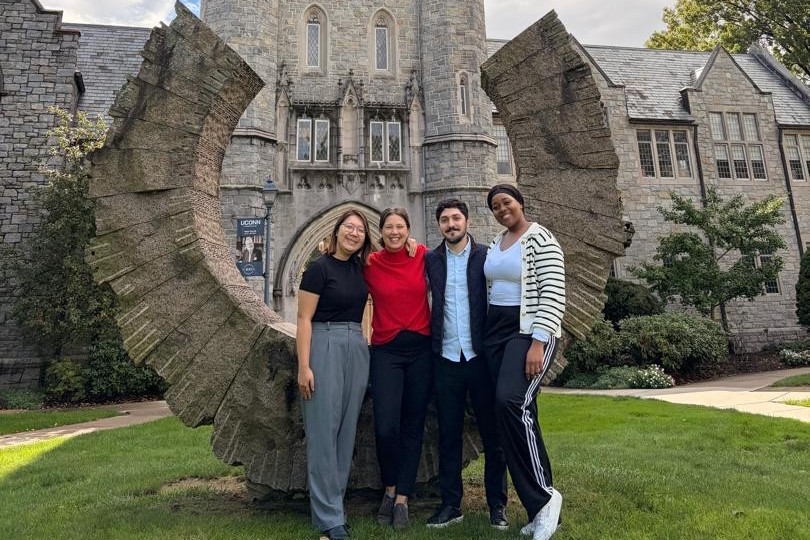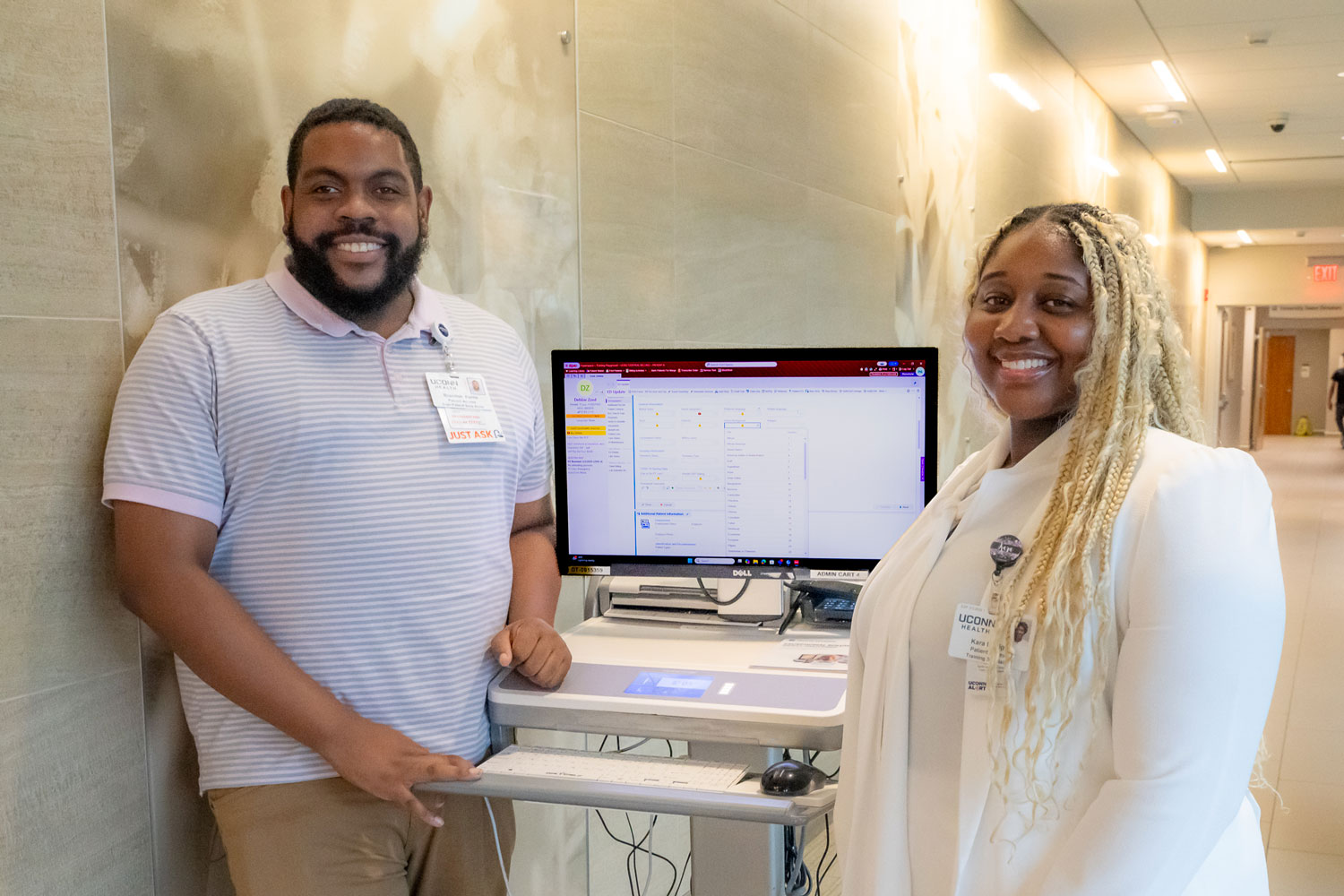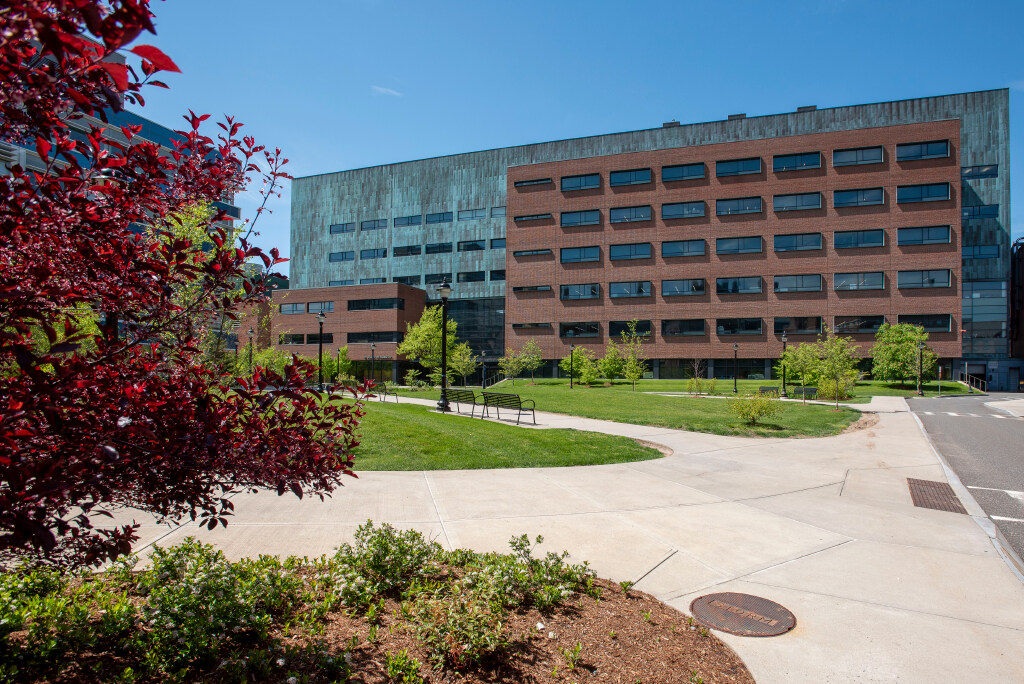UConn Sustainability Action Plan Taking Wide-Ranging Approach to ‘Green’ Future
UConn has established a detailed plan to measure progress and achieve a wide range of sustainability goals, a commitment that President Radenka Maric describes as foundational to the University’s core values and mission.
The UConn Sustainability Action Plan delineates specific actions to achieve carbon neutrality by 2030; conserve resources; integrate sustainability across UConn’s academic and research activities; ensure equity and engagement; and establish partnerships and support innovation to address sustainability challenges.
“The Sustainability Action Plan outlines our strategic framework to cultivate a culture of environmental responsibility, social equity, and economic viability across all facets of our institution … (It) embodies our unwavering commitment to lead by example, embrace innovation, and create a resilient and sustainable future for our University and beyond,” Maric wrote in its introduction.
It complements UConn’s Strategic Plan, interweaving five key sustainability objectives with the 10-year strategic plan’s initiatives in academics, research, inclusivity, and other critical areas.
The Sustainability Action Plan’s emphasis on interdisciplinary collaborations also has inspired this month’s launch of UConn’s new ECollaboration Sustainability Network (ESN), a forum for students, faculty, and members to network, collaborate, and share sustainability-related information.
More information on the Action Plan will also be available at the annual UConn Earth Day Spring Fling, which takes place from 11 a.m. to 2 p.m. on Wednesday, April 17, on Fairfield Way at UConn Storrs.
Even before formalizing its commitments through the Sustainability Action Plan, UConn has made significant progress in just the past few years toward reducing its carbon footprint.
Its on-campus water use at Storrs has dropped by about 10% since 2020, or about 40,000 gallons less per day. Comprehensive recycling programs have also helped it decrease waste disposal by about 25% in the same short time period.
UConn is working toward carbon neutrality by 2030 with the goal of being entirely carbon zero by 2040, and serving as a living laboratory to demonstrate and develop new approaches to mitigating climate change’s harmful effects.
In shaping the Sustainability Action Plan, Maric and members of UConn’s Carbon Reduction Working Group included a wide range of voices from climate experts, students, faculty and staff, community partners, and other stakeholders.
“We are committed to accountability through regular assessments, benchmarking, and reporting on key performance indicators,” Maric wrote. “Engaging stakeholders and regularly updating our community on progress will drive continuous improvement.”
‘A Dynamic and Multi-Faceted Approach’
UConn invests significantly in initiatives and facilities that foster collaborative research and learning environments, such as the new Science 1 building, and it plans to continue those efforts while connecting with other stakeholders to drive innovation.
The University collaborates with more than 165 institutions worldwide across 48 countries, and has partnerships with industry and other collaborators as part of its efforts.
“The Academic Research and Collaboration Vision at UConn is highlighted by a dynamic and multi-faceted approach … The focus on collaborative and interdisciplinary strategy is a key aspect of UConn’s Sustainability Action Plan, aiming to address bigger challenges and find more innovative solutions through collective effort,” the report says.
The President’s Carbon Reduction Working Group included students, faculty, and staff, while the Office of Sustainability within UConn’s Institute of the Environment (IoE), is an important focal point for UConn’s sustainability initiatives.
Experiential learning will continue to be an important part of UConn’s sustainability education efforts, with students having access to internships, grant programs for interdisciplinary projects, on-campus groups and residential options, and other offerings.
The President’s Research Investment in Sustainability Measures, Actions, Technologies, Initiatives, and Communities (PRISMATIC) also provides funding opportunities to undergraduate students supporting the pledge to reduce UConn’s carbon footprint steadily as it strives toward carbon neutrality by 2030.
Education, Research, Social Responsibility, and Outreach
UConn is expanding sustainability-focused education, awareness campaigns, and community engagement initiatives to inspire behavioral change and foster a culture of sustainability. It is also advancing social equity through inclusive policies, diversity programs, fair labor practices, and community partnerships.
UConn’s work in sustainability includes investing in interdisciplinary research, innovation hubs, and partnerships to develop sustainable solutions and technologies such as energy through hydrogen, fuel cells, microgrid cogeneration batteries, solar, and wind systems.
UConn has more than 200 faculty whose academic and research focus is in the areas of sustainability, climate change, and clean energy – including many who are among the most prominent in their fields.
Starting in 2019, UConn implemented a general education requirement in environmental literacy to ensure students are provided with perspective on the interaction between society and the natural world, as well as the challenges associated with environmental stewardship.
It offers more than 80 courses across five of its schools and colleges that students can take to meet that requirement and notably, they represent less than half of the University’s extensive academic offerings to which students have access.
Students can major in 17 undergraduate degree programs across three of UConn’s colleges, while UConn has more than 20 graduate and post-graduate programs directly or partially related to sustainability and the environment.
Sustainable Energy Use, Utility Operations, and Waste Management
UConn is enhancing waste reduction and recycling programs, promoting circular economy principles, and minimizing single-use plastics across campus toward a zero-waste goal.
The work corresponds with the 2015-2023 Master Plan, which includes a framework of building standards and other decisions on capital projects that support sustainability.
For instance, UConn already has received LEED Gold status from the U.S. Green Building Council on multiple construction projects, plus several others with silver certifications, since adopting a policy in 2007 for sustainable methods in all major projects. It also hopes to reach LEED Platinum in the future when possible.
LEED-certified buildings are designed with methods to conserve energy and water, cut down on waste sent to landfills, reduce harmful greenhouse gas emissions, reduce operating costs, and ensure a healthy environment for occupants.
UConn is undertaking a major energy audit across its campuses; will carefully site and orient future buildings to mitigate the “heat island” effect and improve energy performance and thermal comfort; and require onsite green-friendly energy systems, such as the geothermal system that will heat and cool the new South Campus Residence Hall.
A wide range of other initiatives are also envisioned in the Sustainability Action Plan, ranging from additional water conservation strategies and technologies to reducing the carbon footprint of UConn’s food through composting and local procurement; requiring green-friendly building materials whenever possible; and managing land in ways that support sustainability and the environment.
UConn will also continue to move its fleet to sustainable energy sources, follow purchasing standards that minimize packaging, promote more use of mass transit to reduce single-occupancy vehicles on the road, and many other steps.
It has designated Discovery Drive as UConn’s model Renewable Energy Corridor, anchored by the Innovation Partnership Building, as a location to highlight the University’s research and technology industry collaborations.
UConn has already made significant progress in its work to align its on-campus energy generation and usage with the University’s goals, and plans to continue more sustainability efforts wherever possible.
The majority of the energy provided at UConn Storrs is generated by the natural gas-powered Cogeneration Plant, which went online in 2006 to replace older, carbon-intensive oil-fired burners.
Through cogeneration, more than 80% of the fuel energy can be harnessed, versus 33% from a conventional electric power plant – all of which has made it a more efficient, green-friendly approach to providing the energy that powers UConn Storrs.
Despite a 44% increase in on-campus square footage since 2000 due to new and expanded buildings, UConn Storrs has reduced its greenhouse gas emissions by 26% from the baseline amounts 20-plus years ago.
The Depot Campus is also powered by a HyAxiom fuel cell that provides 100% of the power required for the campus, plus heating for the Center for Clean Energy Engineering (C2E2) research laboratories.
UConn also reinvests renewable energy credit payments that it receives from utility providers back into sustainability measures on campus. UConn receives about $2.5 million in those payments annually and, because it invests that money back into green efforts, it gets an enhanced Eversource Energy conservation rebate of about $2.5 million annually.
UConn is using rooftop solar panels where possible, including on the Science 1 building and the Peter J. Werth Residence Tower; plans to add more solar arrays on parking canopies; and has implemented more metering in campus buildings to track the use of electricity, steam, and water.
It also plans to expand the number of electric vehicle charging stations, hydrogen fuel cell vehicles and fueling centers, and potentially add solar for bus shelters and signage in about two dozen on-campus locations.
Latest UConn Today
- Dr. Madison Doolittle Receives American Federation for Aging Research GrantFunding will support Doolittle’s tissue aging research
- UConn Law Attracts Fulbright ScholarsFour of this year’s 36 LLM students came to the School of Law through the Fulbright Program.
- Existing Preservation Laws Could Protect Rural Public Schools from Vouchers, ChartersStudy suggests governments could create 'education preserves' around rural public school districts and issue regulations to govern charter schools and voucher programs within those borders, similar to the way hunting preserves have regulations to protect the natural resources within them
- Pilot Program Aims to Foster AI Literacy for All UConn StudentsUConn’s new on-demand, lab-supported course is helping students use AI responsibly for learning, creativity, and belonging
- Collecting More Race, Ethnicity, Language DataMeet some of the team behind UConn Health’s effort to improve health care quality, address patient disparities with more REL options
- UConn Pharmacy Student Receives the Gateway to Research AwardKayla Barca, a fifth-year Pharm.D. student, has received the Gateway Award from the American Foundation for Pharmaceutical Education (AFPE) for her research in opioid use disorder. With the support of her mentor, Gregory Sartor (Ph.D.), Kayla has excelled both in the classroom and laboratory, evidenced by this prestigious award.












